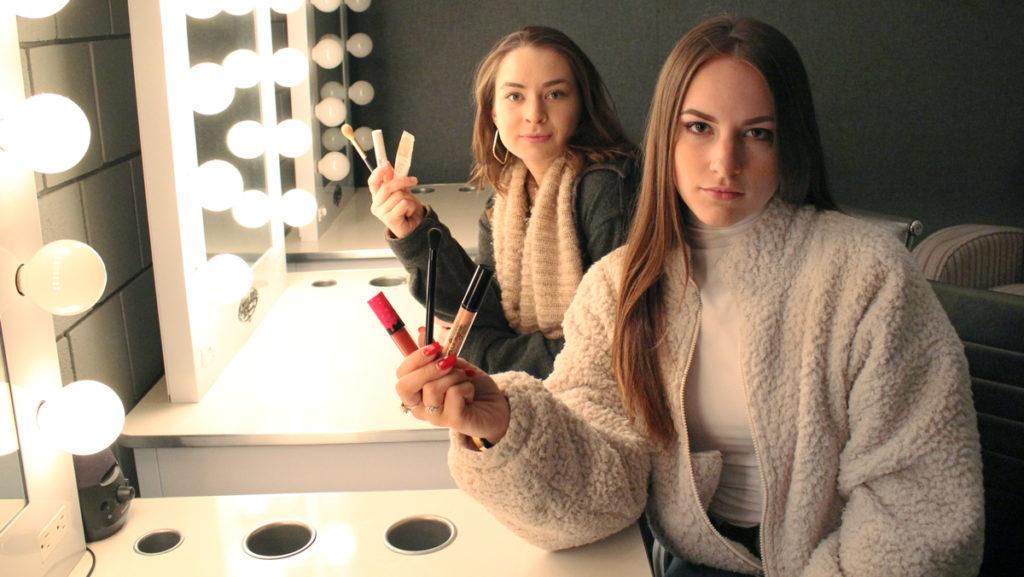Ithaca College seniors Stephanie Siok and Morgan LaDuke have been selected to present their research project, “Not-So-Clean-Cosmetics,” at the National Conference of Undergraduate Research.
Both will be attending the conference from March 26 to 28 in Bozeman, Montana, to present their findings.
The research was done in their capstone class for their communication management and design major, Critical Issues In Organizations, with Dennis Charsky, associate professor and communication management and design program director in the Department of Strategic Communication.
Contributing writer Lucy Calderon sat down with Siok and LaDuke to discuss their research about the cosmetics industry, what they learned and how they hope the industry will change.
This interview has been edited for length and clarity.
Lucy Calderon: What sparked your interest in looking into this topic?
Stephanie Siok: So I really got interested in sustainability as a whole by being in college. … Then, it was kind of when I got my internship in Los Angeles and we did health and wellness [public relations] that I kind of saw that side of brands and got really into cosmetic brands, … so I work at the Ulta in Ithaca. … We talk about sustainability all the time, but a lot of people don’t really talk about the sustainability behind cosmetics brands. And then, I had taken so many CMD classes in corporate communications and learning about corporate social responsibility [CSR], and that’s really where my passion stemmed was in CSRs because that’s what brands give back to society, and what they give back to the planet. … Holding companies accountable for stuff like that is really important.
LC: How did you go about conducting your research?
Morgan LaDuke: It was for one of our classes, [Critical Issues in Organizations]. It was our capstone actually, and we basically went and looked at a bunch of different academic databases, … but we also looked at a lot of blogs and just research that people have done, and it was really surprising to see how difficult it was to find information. It took a really long time. I also have a friend from high school who is a certified makeup instructor, and I interviewed her, and she was just saying how even for professional makeup artists, it’s almost impossible for them to find brands that are sustainable.
LC: Did you conduct your own data or just look at data?
ML: We found a lot of websites that would tell us what types of chemicals were in cosmetics, and what they would do, and a lot of them could be cancer-causing or really bad for oceans. So it was really interesting to see, but it was also sad to see it’s in basically every sort of cosmetic, and also other hygiene products like soaps and toothpaste.
LC: Has your research made you want to change your shopping behavior?
ML: To be completely honest, it hasn’t. The reason why is … because it’s so difficult to find brands. When we looked at brands that claimed that they were good, you would delve in further, and they actually weren’t. It would be great to be like, ‘Yeah I totally use sustainable brands now,’ but it’s so hard to find that. … I definitely try to find brands that use less waste, and I definitely recycle things when I can, but it’s still really difficult to find things that are good for you.
SS: For me, it is hard because I work at Ulta, and I get a discount. So a lot of the times when people come to me for recommendations, I try to lean them toward something that I know is made a little better, but people are going to buy what they want to buy. But for me, personally, I’ve tried, even just aside from cosmetics, shopping towards brands that match my values is really important to me, more so as I’m getting older, too — like obviously avoiding fast fashion and not really fast cosmetics.
LC: So, you are both going to present [at the conference]. How did you make that happen because you said one person was sponsored?
SS: So [Ithaca College] only sponsors one person per group, so Morgan is getting the sponsorship and I’m, with the help of lots of family and friends and my own savings, going out there to present, too. I did a fundraiser, and it really helped a lot, and I’m grateful that people stepped in and helped because this is a once–in–an–academic–career type of thing.
LC: What do you hope will change in leading cosmetic companies as a result of your work?
SS: Personally, I really would love to go into a professional job that works with stuff like this just because I’m into CSR and specifically beauty brands. … I hope that since we are in a generation of more people putting their money toward brands that are doing good things and openly have good CSR, … I hope that the cosmetics brands will step their game up and recognize that and change with the times and see that corporations are what’s causing climate change.
ML: I’m going to add a statistic that I always share because it’s my favorite statistic that we learned, but with cosmetics, the [Food and Drug Administration] has regulated 11 chemicals in cosmetics in the U.S., while in the EU, they’ve banned over a thousand. That’s crazy, first of all. My view is that since it looks like the government isn’t going to do anything when it comes to these regulations, … these brands need to step it up because I think that people our age are going to go for brands that are good and helping the environment, and I think that the only way to see a change in this is these cosmetics brands being like, ‘Wow, we really need to get with the times and change our ways.’








